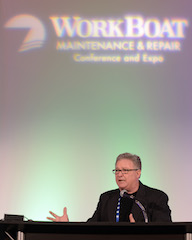When coach Terry Bowden gives a talk, it's more than the usual analogies between football and business. It's about winning in hard times, and often with less resources than the competition.
"It's how you lead people how you motivate people ... There's times when you can't throw money at the problem," the University of Akron's football coach said in his keynote address today at the WorkBoat Maintenance & Repair Expo and Conference in New Orleans. "Sometimes you can't go out and get better players, you can't get money to build a bigger stadium."
Bowden's talk capped three days at the inaugural event, where industry issues of getting enough people and resources were a major topic of conversation among both presenters and audiences. With energy prices and equipment idling and revenue far down, there's also lots of worry about what happens when demand comes back for an industry already facing a deep shortfall of skilled workers in just a few years.
Maritime trade educators and recruiters hammered throughout the conference on the need for adapting to attract and retain young talent. Bowden spoke of the same in his job, coming as he does from a traditional football family that his produced him, his father Bobby and brother Tommy — with 625 victories between them, the winningest coaching family in NCAA Division I football history.
"If you're not willing to find some way to change and adapt, you're going to get beat," Terry Bowden, head coach at Akron since the 2012 season, said.
At age 59, he admitted, "I'm not so great with technology." But he learned to use social media, to tap into students' social circles and connect with potential players. And that's critical to compete, he added.
"It's about me finding great athletes one day quicker" than other coaches, he said.
That prompted one question from the audience, about "kids today versus kids 20 years ago." That too had been a topic at the conference, on the reluctance of more young people to take on the heavy work of shipbuilding or working at sea.
"My dad had a saying: 'The kids didn't change, the parents did,'" Bowden replied.
But, Bowden said, today he still sees an essential truth. "The players today know that if you care about them ... they really don't care how you coach," he said.
This is the second time at Akron for Bowden, who had an assistant coaching job there in 1986. After coaching at Auburn for five years, Bowden did a 10-year stint in broadcasting as a college football analyst with ABC.
"It was fun. You get paid to watch fotball all day. You're the analyst, so you're never wrong, and they fly you to the playoffs. What's wrong with that?" he recalled.
"But I decided at 50 years old I was going to get back in," he said.
So he moved back in with his parents, sort of. Bowden went to Tallahassee, Fla., to watch his father, still coaching Florida State University, putting the team through training.
"Just going back there and making the coffee put me back into it" from his early days as an assistant coach and go-fer, Bowden said. He made a point of being first in the morning to make that coffee. It was what he had done many years before as a young assistant coach, working with his father during graduate school at FSU, part of the expectation that assistants should do all they can to help the coach.
When word went around that the younger Bowden was getting his own coaching job - he went to North Alabama in 2009 - one of the assistant coaches came up to him with a resume'.
But in his mind, Bowden had already dismissed the young man, thinking "Why weren't you making the coffee?"
"Are you still wiling to make the coffee?" Bowden asked his audience. He brought it back to his theme of maintaining drive.
"Do you still want to be number 1? Do you still want to be the best at what you do?" Bowden said. "The biggest problem is urgency, you put it off until tomorrow."
Urgency, Bowden said, is what he saw in his best players. And also in his father, who was nudged into retirement by FSU.
"Why was my dad still coaching at age 80 at FSU? He had like 387 wins, the second-winningest coach in history," Bowden said. "He didn't say so, but I knew. He didn't want to be second."




